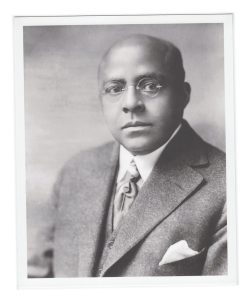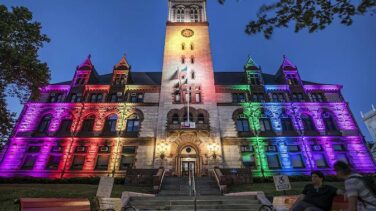This is the fourth post in our Black History Month series. Be sure to read our profiles of Dorothy Mae Robinson and Samuel J. Cullers.
Philip A. Payton, Jr.
Life: 1876-1917
Birthplace: Westfield, Massachusetts
Education: Livingstone College
Philip A. Payton, Jr. is noted as one of the first Black real estate moguls in the United States.
Payton made the decision to move to New York City in 1899 after working in his family business, a barbershop and a stint at Livingstone College. He wanted to make a name for himself much to his family’s chagrin.
When he arrived in the city, he worked at a department store, as a barber and then a porter for a real estate company earning $8 a week. That role would become his inspiration for his life’s work and passion. The next year, he opened his first company, Brown & Payton, in Midtown Manhattan, a real estate agency focused on servicing Black tenements.
Even after his partner left the business, Payton continued to operate it. During this time, his family faced hunger and poverty, with his wife Maggie supporting the family as a seamstress while the business struggled. They eventually moved to Harlem where Payton noticed the high vacancy rates caused by White owners who did not want Black renters. His first big break was a result of racism and prejudice.
“My first opportunity came as a result of a dispute between two landlords in West 134th Street. To ‘get even’ one of them turned his house over to me to fill with colored tenants. I was successful in renting and managing this house, after a time I was able to induce other landlords to… give me their houses to manage.” – Payton
Payton continued to convince white owners to put “profit over prejudice.” At the time, Black renters made significantly higher rents than white tenants. Payton would often ask owners why they’d want a unit to sit empty when they could be making even more money if they could ‘overlook’ race.
This strategy worked especially during a time when African Americans were moving to NYC to escape the oppression, White Supremacy and danger of the South.
Payton eventually became a building owner, not just a manager. In 1905, he started a new company, the Afro-American Realty Company, which operated until 1908. He later founded another firm, the Philip A. Payton, Jr. Company, a year before his death in 1917.
While known as “the Father of Harlem” no statue or commemoration honors him in the community.
Additional Information about Philip A. Payton, Jr.
- Philip A. Payton, from The New York Times Overlooked series, which recognized “remarkable black men and women never received obituaries in The New York Times — until now” (2019)
Continuing This Work Today
Black entrepreneurs are continuing in Payton’s footsteps, changing neighborhoods, and entire cities, one building at a time.
Philip Michael, CEO and founder of NYCE Companies, is a real estate entrepreneur, investor and developer on a mission to “help end the racial wealth gap.” Check out his development projects, sign up to be notified about the app he’s building and be sure to buy his book, Real Estate Wealth Hacking: How To 10x Your Net Worth In 18 Months.
Ernst Valery, founder of EVI and co-managing partner of SAA|EVI, a development shop building projects that benefit urban communities, striking a “balance between solid financial returns and inclusive community development.” Valery also recently created the Auquo Fund to invest in underrepresented real estate developers (“women, Black, Brown, or Immigrant developers”).
Andrew Colom and David Alade are the founders of Century Partners, a Detroit development firm doing grassroots community development, one house at a time, in historic neighborhoods in the city. In 2019, Century Partners was recognized by the Harvard University Joint Center for Housing Studies for their unique approach to revitalizing communities.
Kirk Sykes, is Managing Director of Accordia Partners, a real estate development and investment firm building several of the largest projects in Boston right now including the 33-acre Dorchester Bay development. Accordia Partners aims to “create opportunities in equity, employment, and education for all of Boston’s citizens.” Sykes serves on the Board of Directors for the Real Estate Executive Council, is Chairman of the Federal Reserve Bank of Boston and was named to the Boston Business Journal’s Power 50 for 2020.
Beyond the development side of the industry, there are more Black brokers, developers, project managers, etc in commercial real estate than ever. That said, it’s still a predominantly white industry. Some individual firms – like those above – and industry associations are trying to change that.
The Builders of Color Coalition (BCC) is a Boston-based organization dedicated to “Increasing access and diversity in Boston’s commercial real estate sector, to create generational impact in expanding economic opportunity.” You can post jobs and RFPs with the BCC and the organization does a tremendous job with ongoing programming. Sponsorship opportunities are available and they are actively hiring for two positions.
The African American Real Estate Professionals (AAREP), led by Carisa Stanley, is doing similar work in the D.C. region.
At the national level, the Real Estate Executive Council is a trade organization founded to “promote the interests of minority executives doing business in commercial real estate.” ULI has also created a DEI Council focused on changing systemic policies, co-chaired by Lisa Gordon.
What to Read Next
- The Numbers Behind Real Estate’s Diversity Problem
- What does it mean to be Black in CRE?
- Business for Good: Auquo Fund (the new fund founded by Ernst Valery)
- Meet the young developers taking on the Fitzgerald neighborhood (Century Partners)
- Philip Michael Is a Real Estate Entrepreneur on a Mission
- Accordia Partners: Diversity & Inclusion Action Plan (coauthored by Kirk Sykes)



